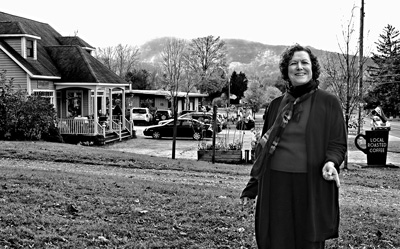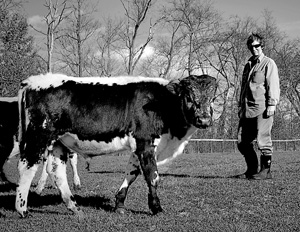News November 2014
On exhibit: A real-life rural town
New Lebanon tests a new approach to spurring tourism
 By JOHN TOWNES
By JOHN TOWNES
Contributing writer
NEW LEBANON, N.Y.
Ruth Abram is the founder of “Behold! New Lebanon,” a new program that encourages visitors and local people to discover the variety of real-world skills and enterprises among the town’s population. The program coordinates instructional demonstrations at local businesses, farms and homes.
When people think of the region’s big tourist destinations, New Lebanon doesn’t typically come to mind.
Although it’s situated at the crossroads of state routes 20 and 22, just across the state line from the Berkshires, the rural town lacks the quaint New England feel of Stockbridge or the boutique-lined streets of Hudson.
But New Lebanon actually has lots of things going on that a visitor might appreciate, and lately the town has been testing a new way of presenting itself to the wider world.
The result is “Behold! New Lebanon,” a nonprofit community-based project that encourages visitors, as well as local people who might be curious, to discover and appreciate the varied mix of real-world skills and enterprises that can be found among the town’s population.
The program, which made its debut on four weekends this fall, offers organized instructional demonstrations at local businesses, farms, homes and other sites. For prices ranging from $15 per event to $75 for a season pass, visitors have been able to learn about everything from building furniture to raising heritage-breed pigs, and they’ve gotten behind-the-scenes looks at attractions like Lebanon Valley Speedway and the local auction house, Meissner’s Auction Service. A shuttle bus carries people from a visitors center to specific events.
“There’s an amazing number of people doing surprising and interesting things here, but their activities are generally not in public view,” explained Ruth Abram, the founder of the program. “The purpose of ‘Behold! New Lebanon’ is to provide the public with access to the community, so they can discover how lively and innovative this town is.”
Although the project’s initial season ended on the weekend of Nov. 1, it is intended to become a permanent attraction, with a calendar of activities stretching on into the future, Abram said.
“The attendance and response to this has been great, and it’s generated a lot of enthusiasm,” Abram said in late October. “We’ve already started planning for next year.”
Reversing a sense of decline
New Lebanon has a heritage of innovation. The town includes the original Shaker community, founded in 1787 and now being restored as a museum. It is also believed to be the site of the nation’s first lending library.
In the early 19th century, the Tilden Family founded the world’s first natural pharmaceutical factory in New Lebanon, and Dr. Joel Shew, considered the founder of hydrotherapy in America, harnessed a natural spring to establish therapeutic baths and a natural health center.
Off the main roads, New Lebanon has areas of scenic beauty that rival anything in the region.
But like many other rural communities, it has also had to contend with economic challenges as population and business activity have shifted to larger urban and suburban regions. The town’s only full-service supermarket, for example, closed several years ago, leaving residents to drive 20 minutes or more each way to stores in Pittsfield or Chatham.
Abram, however, stresses that, on closer inspection, New Lebanon has plenty of assets.
“People here have a wide range of important skills and vital enterprises,” she said.
Besides attractions like the speedway and auction house that have always been open to the public, the town still has some traditional farms and, like other parts of Columbia County, has become a destination for people in a 21st century back-to-the-land movement focused on organic and niche agriculture. The town has also become home to a variety of entrepreneurs who are drawn by the idea of living in a rural setting.
“There are … young people who are attracted by the inherent characteristics of the community and are moving in with their values and dreams,” Abram said. “Many of them are also bringing innovative and scientific approaches to traditional rural living.”
Celebrating a community
Abram is a historian and social activist who grew up in Georgia and moved with her family to the New York City area when she was 17. While living in the city, she founded the Tenement Museum, an educational institution dedicated to the immigrant experience, in a preserved tenement on Manhattan’s Lower East Side.
She moved to New Lebanon about seven years ago, when her husband got a job in Albany, and they found a house that attracted them here.
Abram said the concept of “Behold! New Lebanon” came to her as a result of conversations with her new neighbors and the frustration she often heard about economic conditions and the closing of important local businesses.
“I kept hearing people say what a great place this used to be, but how it has declined,” she said.
She decided to draw on her experience to develop a project she hoped would give the town a boost by focusing and capitalizing on its identity as a modern rural community. She began floating the idea to others last year.
Abram said she and the other organizers want “Behold! New Lebanon” to reflect the realities of modern rural life, rather than the idealized, upscale version that is often sold as country living today.
At the same time, she said, they did not want to present the town as some carefully preserved historical time capsule.
“There’s nothing ‘storybook’ about it, and it’s not always neat and tidy,” she said. “Nobody wanted to change anything for this. The idea is to honestly present contemporary rural life as it really is.”
To recruit a roster of guides, she surveyed people in town about what skills they had, especially those that urban visitors were not likely to be experienced with.
“It became a very long list,” Abram said.
Assessing diamonds, tracking deer
On the weekends when “Behold! New Lebanon” takes place, a slate of designated 60-to-90 minute demonstrations are scheduled at people’s homes, businesses or other sites of activity. People buy tickets at the visitors center, at 14398 State Route 22, and select the specific demonstrations they want to attend. A bus shuttles them to the sites.
Abram said the events are a mix of general information and instruction in practical skills, particularly those that visitors from urban areas are unlikely to have experienced.
“One reason people attend these demonstrations is to learn things they can use in their own lives,” she said.
The roughly 50 demonstrations, instructors and skills in this fall’s inaugural season have indeed been varied, encompassing everything from farming and food production to the arts, printing, making wooden gifts, nature skills, furniture making, homesteading and many other fields of endeavor.
A demonstration called “Speed Demons” offered a behind-the-scenes look at Lebanon Valley Speedway, presented by the racetrack’s owner Howard Commander. In another offering, “Hitching the Horse to the Plow,” Sarah Steadman and Evan Thaler-Null, two local growers who are trying to minimize their consumption of fossil fuel, showed how they use the power of animals to cultivate their land.
Several local restaurants offered meals and culinary talks, and Melanie Hunt of Blueberry Hill Market Café showed visitors how to bake New Lebanon Slab Pie.
Visitors have gotten to see how a local farm raises heritage breeds of pigs in the woods; others took part in a workshop on tracking deer. Still other demonstrations have included instruction on identifying the quality of diamonds, how to build a terrarium, and a tour nd demonstration of auctioneering by Delores Meissner of Meissner’s Auction Service.
Heritage cattle, border collies
 Cynthia Creech, who operates Artemis Farm on 120 acres of scenic upland, led a workshop called “Cow Tails” in which she explained her ongoing effort to preserve a breed known as Randall cattle, which originated in Vermont. In 1987, Creech, who was then living in Tennessee, acquired several Randalls that were among the last of the breed. Since then, she has become dedicated to breeding and raising them.
Cynthia Creech, who operates Artemis Farm on 120 acres of scenic upland, led a workshop called “Cow Tails” in which she explained her ongoing effort to preserve a breed known as Randall cattle, which originated in Vermont. In 1987, Creech, who was then living in Tennessee, acquired several Randalls that were among the last of the breed. Since then, she has become dedicated to breeding and raising them.
Realizing that they were not suited for the southern climate, Creech brought them back to the Northeast, eventually settling with them on a farm in New Lebanon. She now has about 100 animals, which she sells for breeding and for meat.
Creech, who also works in the court system, said she agreed to participate in “Behold! New Lebanon” for a combination of reasons.
“I thought it would be good for the town, and I also thought it would be good PR for the Randalls,” she explained. “Also, Ruth is a very impressive person, and when she gets involved in a project, it’s a smart idea to join if she asks you.”
Another participant is Eric Johnson, who with his wife, Lori, offered a demonstration on training border collies.
Eric, who drives a delivery route for the U.S. Postal Service, is representative of the economic versatility of many rural people. The family raises animals and crops for their own use and for friends. He also has developed a business, Wild Goose Chase NE, that uses his border collies to scare geese away from homes, schools and other sites where their habit of congregating is unwelcome.
“You have to be entrepreneurial and be willing to do different things to make it here,” he said.
A model for other towns?
Abram said “Behold! New Lebanon” is intended to aid local economic development while also enhancing the community’s sense of identity and pride. She said the program is designed to eventually support itself through ticket sales, a gift shop and other revenue sources. She and other organizers also plan to expand the calendar of events.
“The goal is for it to become a self-sustaining program that will give an economic boost to the town,” Abram said.
Besides attracting more tourists to New Lebanon, she said, the program gives more visibility, and potentially sales, to local entrepreneurs and businesses. The guides are also paid honoraria, which provides them with an additional source of income.
But Abram views the project more broadly. She described it as a “living museum” that, rather than being based within the walls of a central facility, is integrated with its surroundings.
“We’re breaking new ground in terms of what a museum can be,” she said. “If successful, ‘Behold! New Lebanon’ can also serve as a model that can be replicated in other rural communities.”
The result could be the beginning of a kind of educational research center focusing on rural America, she said. One goal of the New Lebanon project, she noted, is to also produce books and films.
Abram acknowledged that some townspeople have been skeptical about the idea of “Behold! New Lebanon,” but she said most have been enthusiastic and supportive.
“We had great luck in recruiting, and many people and businesses have come forward to participate and help,” Abram said.
For example, the Shed Man, a local business that sells outbuildings, “has loaned us a pool house on their site for the visitors booth,” she said.
To test the waters among potential visitors, she also contacted people who have second homes in the area.
“I scoured the tax rolls to find part-time residents,” Abram said. “I arranged a tour of the town and invited them. They were extremely interested in what they saw. Many offered to help out and have contributed to the project in a variety of different ways.”
Abram said the process of organizing “Behold! New Lebanon” has also had the beneficial effect of bringing people in the community closer together.
“People get busy with their own lives and priorities and aren’t always aware of what others are doing,” she said. “With this project, people have gotten to know each other better. Even longtime residents of New Lebanon have been surprised and startled at how much is really going on here.”

